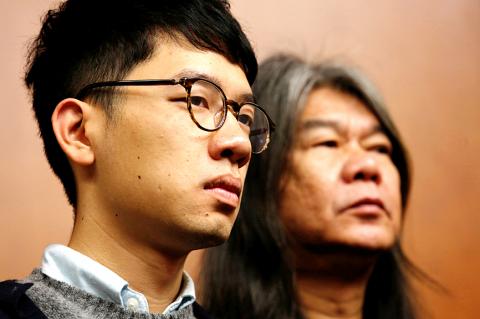Leaders of Hong Kong widened their legal fight against the city’s fledgling independence movement on Friday, targeting four more lawmakers over oaths taken at a Legislative Council swearing-in ceremony in October.
Hong Kong Chief Executive Leung Chun-ying (梁振英) and Secretary for Justice Rimsky Yuen (袁國強) began the action on Friday after lawmakers Sixtus “Baggio” Leung (梁頌恆) and Yau Wai-ching (游蕙禎) lost a legal appeal over their disqualification, the government said in a statement.
The government proceedings seek “to declare their oaths purportedly taken as invalid and their office as now vacant,” the government said in a statement.

Photo: Reuters
Beijing is alarmed about the growing appeal of independence and self-determination in the former British colony, which returned to Chinese rule in 1997 under a “one country, two systems” formula, allowing it wide-ranging freedoms, a separate legal system and specifying universal suffrage as an eventual goal.
The latest move came after Beijing staged a rare interpretation of Hong Kong’s Basic Law early last month to effectively bar democratically elected Leung and Yau from taking office.
Lau and Leung pledged allegiance to the “Hong Kong nation” and displayed a banner declaring “Hong Kong is not China” during a swearing-in ceremony for the Legislative Council in October.
While their oaths were aborted before they were disqualified, the latest action targets lawmakers who have already taken office.
They include Legislative Councilor Leung Kwok-hung (梁國雄), a veteran activist known across the territory as “Long-hair.”
The others are younger lawmakers Edward Yiu (姚松炎), Lau Siu-lai (劉小麗) and Nathan Law (羅冠聰), the government said.
The government is challenging the actions of Legislative Council President Andrew Leung (梁智鴻), to accept, or allow them to re-take, their oaths.
In the statement, the government said it had a constitutional responsibility to uphold the Basic Law and that the action was in the public interest.
“The government stresses that the decision to initiate legal proceedings was purely a decision based on legal ... consideration, without any political consideration,” it added.
Senior democratic figures are warning of a popular backlash against Leung Chun-ying, whom they accuse of using the independence issue to wage a legal “coup” against long-standing democratic forces, on behalf of Beijing.

MORE VISITORS: The Tourism Administration said that it is seeing positive prospects in its efforts to expand the tourism market in North America and Europe Taiwan has been ranked as the cheapest place in the world to travel to this year, based on a list recommended by NerdWallet. The San Francisco-based personal finance company said that Taiwan topped the list of 16 nations it chose for budget travelers because US tourists do not need visas and travelers can easily have a good meal for less than US$10. A bus ride in Taipei costs just under US$0.50, while subway rides start at US$0.60, the firm said, adding that public transportation in Taiwan is easy to navigate. The firm also called Taiwan a “food lover’s paradise,” citing inexpensive breakfast stalls

TRADE: A mandatory declaration of origin for manufactured goods bound for the US is to take effect on May 7 to block China from exploiting Taiwan’s trade channels All products manufactured in Taiwan and exported to the US must include a signed declaration of origin starting on May 7, the Bureau of Foreign Trade announced yesterday. US President Donald Trump on April 2 imposed a 32 percent tariff on imports from Taiwan, but one week later announced a 90-day pause on its implementation. However, a universal 10 percent tariff was immediately applied to most imports from around the world. On April 12, the Trump administration further exempted computers, smartphones and semiconductors from the new tariffs. In response, President William Lai’s (賴清德) administration has introduced a series of countermeasures to support affected

CROSS-STRAIT: The vast majority of Taiwanese support maintaining the ‘status quo,’ while concern is rising about Beijing’s influence operations More than eight out of 10 Taiwanese reject Beijing’s “one country, two systems” framework for cross-strait relations, according to a survey released by the Mainland Affairs Council (MAC) on Thursday. The MAC’s latest quarterly survey found that 84.4 percent of respondents opposed Beijing’s “one country, two systems” formula for handling cross-strait relations — a figure consistent with past polling. Over the past three years, opposition to the framework has remained high, ranging from a low of 83.6 percent in April 2023 to a peak of 89.6 percent in April last year. In the most recent poll, 82.5 percent also rejected China’s

PLUGGING HOLES: The amendments would bring the legislation in line with systems found in other countries such as Japan and the US, Legislator Chen Kuan-ting said Democratic Progressive Party (DPP) Legislator Chen Kuan-ting (陳冠廷) has proposed amending national security legislation amid a spate of espionage cases. Potential gaps in security vetting procedures for personnel with access to sensitive information prompted him to propose the amendments, which would introduce changes to Article 14 of the Classified National Security Information Protection Act (國家機密保護法), Chen said yesterday. The proposal, which aims to enhance interagency vetting procedures and reduce the risk of classified information leaks, would establish a comprehensive security clearance system in Taiwan, he said. The amendment would require character and loyalty checks for civil servants and intelligence personnel prior to